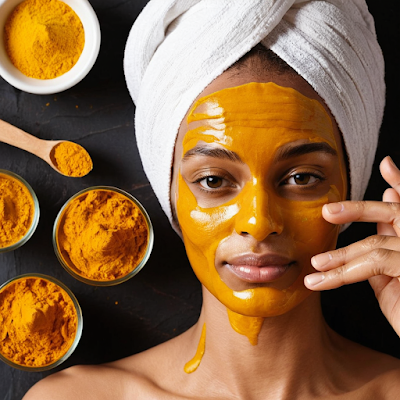"Turmeric: Golden Treasure for Health and Wellness"
By: Ravichandra
Ayurvedic Properties Of Turmeric
Turmeric, known scientifically as "Curcuma longa," holds significant importance in Ayurveda, where it is often referred to as "haridra" in Sanskrit. Renowned for its powerful medicinal properties, turmeric is considered an essential herb for balancing the doshas: vata, pitta, and kapha.
Main Benefits of Turmeric in Ayurveda:
-Anti-inflammatory: Turmeric is well-known for its anti-inflammatory properties, making it beneficial for managing conditions like arthritis.
- Antioxidants: It helps combat oxidative stress and prevents cellular damage.
- Aids Digestion: Turmeric stimulates digestion, increases bile production, and alleviates bloating and gas.
-Skin Health: Its antibacterial properties make turmeric advantageous for skin conditions such as acne and eczema.
- Immune System Support: Regular consumption is believed to strengthen the immune system and enhance overall health.
Uses in Ayurveda:
- Golden Milk: A popular Ayurvedic drink made from milk and turmeric.
- Culinary Uses: Frequently used in cooking for both flavor and health benefits.
- Topical Application: Often mixed with oils and other ingredients for skincare.
Considerations: While turmeric is generally safe, it's advisable to consult an Ayurvedic practitioner for personalized guidance, especially for those with specific health concerns or conditions.
Turmeric in Ayurvedic Practice
Turmeric, known as "haldi" in Ayurveda, is celebrated for its numerous health benefits. Here are some of the key advantages of turmeric in Ayurvedic practice:
1. Anti-inflammatory Properties: Turmeric contains curcumin, which has powerful anti-inflammatory effects. It can help reduce inflammation associated with conditions like arthritis.
2. Digestive Health: Turmeric aids digestion and may help alleviate bloating and gas. It stimulates bile production, which is beneficial for digesting fats.
3. Antioxidant Properties: Turmeric is rich in antioxidants, which combat oxidative stress and protect cells from damage caused by free radicals.
4. Boosts Immunity: Regular consumption of turmeric can enhance immune system function, helping the body to fight infections and diseases.
5. Skin Health: Due to its antibacterial and anti-inflammatory properties, turmeric is often used in skincare. It can assist with conditions like acne and eczema, promoting healthy skin.
6. Detoxification: Turmeric supports liver function and aids in detoxification, helping the body eliminate toxins more effectively.
7. Pain Relief: Thanks to its anti-inflammatory properties, turmeric is commonly used as a natural remedy for joint and muscle pain.
8. Mood Improvement: Turmeric is believed to have mood-stabilizing effects and may help reduce symptoms of depression and anxiety.
9. Heart Health: Turmeric can promote heart health by improving endothelial function and lowering cholesterol levels.
10. Respiratory Health: The anti-inflammatory properties of turmeric may benefit respiratory conditions by alleviating symptoms of asthma and bronchitis.
In Ayurveda, turmeric is used in various forms, including as a spice in foods, in teas, and in topical applications. However, it’s important to consult a healthcare professional before starting any new supplement or treatment, especially if you have an underlying health condition or are pregnant.
Golden Milk Recipe
Golden milk, also known as turmeric milk, is a calming hot drink primarily made from milk (dairy or plant-based) and turmeric. It often includes cinnamon, ginger, black pepper, and other spices for added flavor and potential health benefits. This mixture is typically sweetened with honey or maple syrup.
Benefits:
- Anti-Inflammatory: Turmeric contains curcumin, which is well-known for its anti-inflammatory properties.
- Rich in Antioxidants: The spices used are packed with antioxidants.
- Aids Digestion: Both ginger and turmeric can support digestive health.
Basic Formula:
- Ingredients:
- 1 cup milk (or a plant-based alternative)
- 1 tablespoon turmeric powder
- 1/2 teaspoon cinnamon powder
- A pinch of black pepper
- Optional: 1/2 teaspoon ginger powder or fresh ginger
- Sweetener to taste (honey, maple syrup, etc.)
Instructions:
1. Combine all ingredients in a small saucepan.
2. Set the heat to medium.
3. Stir constantly until the mixture is close to boiling (do not let it boil).
4. Pour into a glass and enjoy!
Feel free to adjust the spices and sweetness to suit your taste!
Turmeric For Skin Health
Turmeric is well-known for its health benefits, particularly for the skin, due to its active compound, curcumin. Here are some key benefits of turmeric for skin health:
1. Anti-inflammatory Properties: Turmeric helps reduce inflammation, making it beneficial for skin conditions like acne, eczema, and psoriasis.
2. Antioxidant Effects: The antioxidants found in turmeric protect the skin from free radical damage, promoting overall skin health and potentially delaying signs of aging.
3. Wound Healing: Turmeric possesses antimicrobial properties that aid in the healing of minor cuts and scratches.
4. Brightening Effects: Regular use of turmeric can help even out skin tone and enhance radiance, which is why it's a popular ingredient in masks and scrubs.
5. Oil Control: Its anti-sebum properties can help regulate oil production, making it especially useful for oily or acne-prone skin.
How to Use Turmeric for Healthy Skin
- Face Mask: Combine turmeric with yogurt, honey, or aloe vera to create a soothing face mask.
- Spot Treatment: Apply a mixture of turmeric and water or honey directly to blemishes to reduce redness and swelling.
- Exfoliating Scrub: Mix turmeric powder with sugar or oatmeal for a gentle scrub that leaves your skin radiant and smooth.
Precautions
- Staining: Turmeric can stain both skin and clothing, so it should be used cautiously and patch tested first.
- Sensitivity: Some individuals may experience irritation. It’s advisable to start with a small amount and monitor your skin’s reaction.
Incorporating turmeric into your skincare routine offers numerous benefits, but it’s important to use it mindfully!







.jpeg)

Comments
Post a Comment